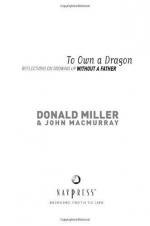
|
| Name: _________________________ | Period: ___________________ |
This test consists of 5 multiple choice questions, 5 short answer questions, and 10 short essay questions.
Multiple Choice Questions
1. What book does Miller first read cover to cover?
(a) A book on how to write your own memoir.
(b) A book of Emily Dickinson poems.
(c) A comic book.
(d) An autobiography of President Eisenhower.
2. What does MacMurray believe is his payment for high-quality work?
(a) Sacrifices in time with his family.
(b) MacMurray does not have to pay for quality work.
(c) Many failed trips to get pictures.
(d) Everyone pays MacMurray for his best work.
3. Which of the following is not a true statement about work according to MacMurray?
(a) Work is a necessity of life.
(b) Work is a reward from God.
(c) Work is spiritual.
(d) All work is honorable.
4. Why does Miller believe he knows very little about girls?
(a) Because every girl he asks out, has turns him down.
(b) Because he has never asked a girl on a date.
(c) Because he is too embarassed to ask his friends about girls.
(d) Because he did not have a father to learn about girls from.
5. What other group of people besides boys and men without fathers does Miller recognize in Chapter 7?
(a) Mothers of boys without fathers.
(b) Women who grow up without a father.
(c) All men and women with fathers.
(d) Miller does not recognize any other groups in this chapter.
Short Answer Questions
1. According to Miller, why should young men say no to cheap sex?
2. Miller believes that young men should do what in order to make decisions?
3. Which of MacMurray's children gets Miller out of bed by begging to be carried down the stairs?
4. Chapter 11 relates a story from a movie about a woman who fails to return correct change for a purchase. How does the clerk at the gas station in this movie describe this woman?
5. In Chapter 10, the men who listen to Miller present his talk question ________________?
Short Essay Questions
1. In Chapter 8, Miller states that young men without fathers as role models are more likely to experience negative consequences in life. What evidence does Miller provide to support this statement?
2. In Chapter 11, Miller uses an example from a movie about a woman who does not return proper change for a purchase. This story illustrates an unusual way to describe sin. What is this?
3. Miller learns to play chess from a friend. He also tells a story about a man, Salome Thomas-El teaching boys from a ghetto to play chess. He sees a connection between playing chess and life for young men raised without fathers. What is this connection?
4. In Chapter 9, why does Miller say that he dated?
5. Many people, including the famous Dr. Alfred Kinsey, have researched sex. What have we learned from these sex researchers?
6. In Chapter 7, Manhood, Miller attends a Promise Keepers rally and then joins the organization. However, he struggles with this membership. Why did he join and what were his struggles?
7. In Chapter 9, Girls, Miller tells the story of a young woman in a coffee shop. Why does he tell this story?
8. In Chapter 11, what does the author tell us that he believes about college?
9. Miller stresses the importance of making wise decisions in Chapter 8. He believes young men without fathers need to be intentional about learning to make decisions. How does he recommend they do this and why?
10. Miller assumes that humans have to work because God is punishing the sinful nature of humanity. MacMurray disagrees. How does MacMurray explain humanity's need to work?
|
This section contains 1,331 words (approx. 5 pages at 300 words per page) |

|




